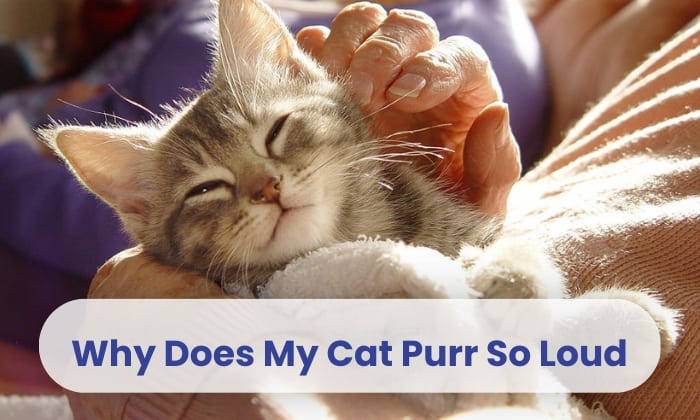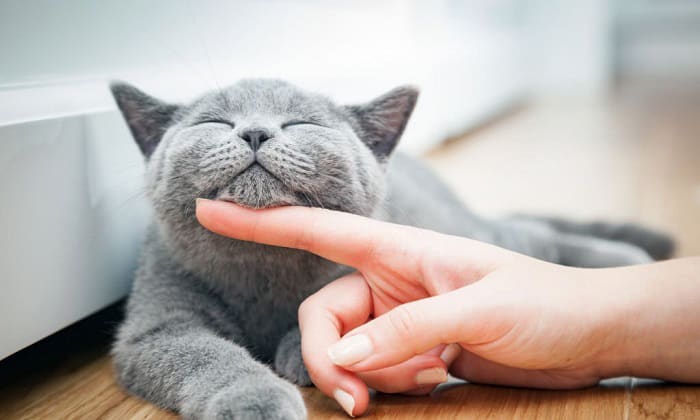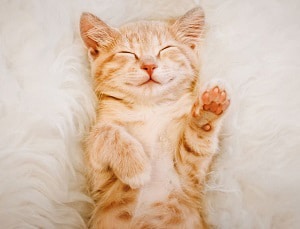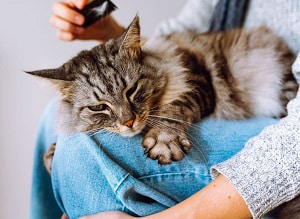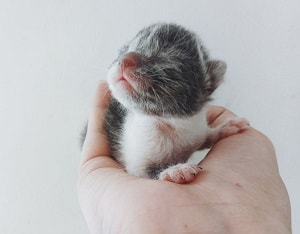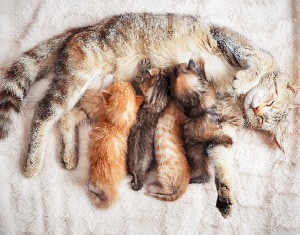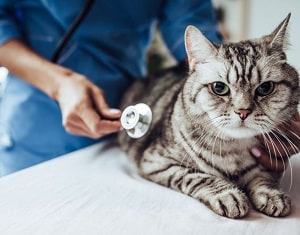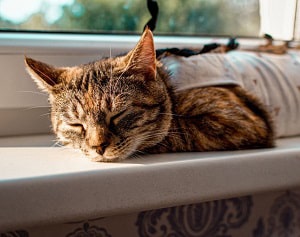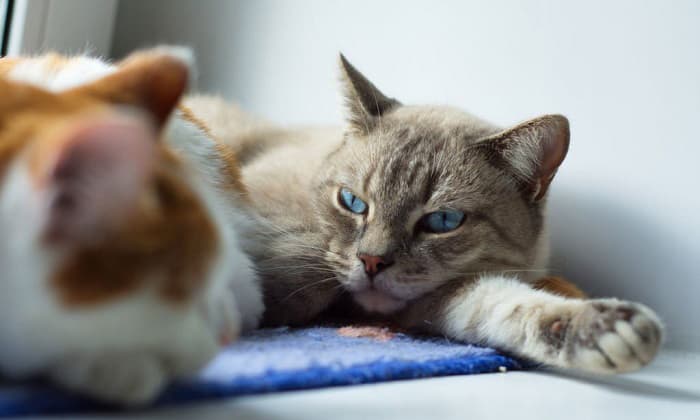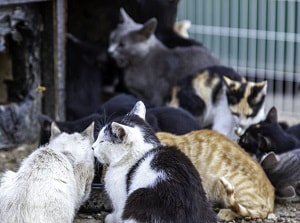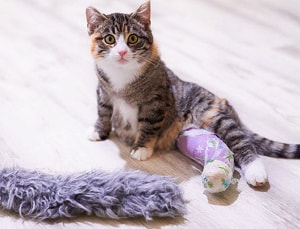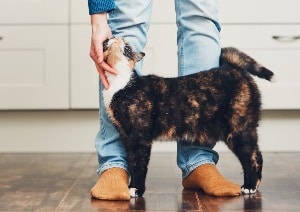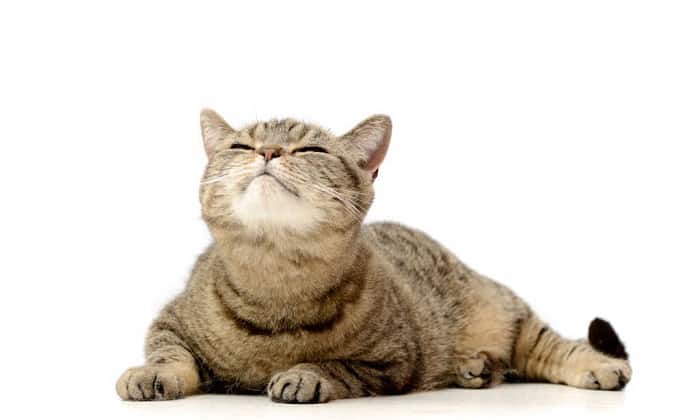Some cat owners may wonder, “Why does my cat purr so loud?”. This occurs for a variety of reasons. Cats purr loudly to express happiness, to get your attention, and to desire to be petted; however, loud purrs can also indicate that the cat is stressed, anxious, or attempting to heal from pain.
There is a wide range of emotions in a cat’s purr. So why does a cat purr so much? What does it mean? Read on to find out what your cat is trying to tell you.
Table of Contents
Why Is My Cat Purring So Loud?
It is common to hear a cat purring. When the cat is purring louder than normal, it may indicate either positive or negative issues. Here are the main causes of a loud cat’s purr.
1. Your cat is happy
Cats purr louder when they are happier! If you pay close attention to your cat, you may hear it purring while sleeping or curling up on your lap. Furthermore, your cat purrs when eating or drinking as a sign of contentment.
When the cat is cuddled, it will become calm and relaxed. My cat also purrs louder when I pet him. Also, there are moments when my cat purrs so loud next to me while expressing contentment.
2. Cats purr to attract your attention
Why is your female or male cat purr so loud? No matter what gender your cat is; actually, they are incredibly attention-seeking. This is typically the reason for their loud behavior. According to researchers, cats purr to express their emotions.
Likely, the cat is trying to get their human’s notice by purring loudly to let them know it’s time for food. It’s important to note that purrs recorded during food solicitation are more urgent and less pleasant than purrs recorded in other situations.
Cats purr loud sometimes because they want to be stroked or want you to play with them. Other times, it may be a request for interaction.
3. Your cat is growing
Some may wonder, “Why does a kitten purr so loud?”. Kittens start purring just days after birth to alert their mothers that it’s time to nurse them.
Some adult cats may continue to purr while they eat, or they may do so to convince their owners that it’s time for dinner. Because of their small bodies, kittens’ purrs are soft and very high. Their purrs will become louder and deeper as they grow older and bigger.
Therefore, if you have a young kitten and are worried because its purrs are softer than your other cats, it’s likely still growing.
4. To soothe others around them
Freshborn kittens have a short time of total blindnes and deafness, so their mothers use purring to draw them near to keep them safe and comfortable.
As the kittens grow older, they keep acting in this manner. So if they see that one of their littermates is unwell, they will purr to make it feel better. They are even capable of sensing your mental distress and will do this as a way to help you unwind.
They can even feel your mind and use it to your advantage. They now use this conduct to try to help those around them.
Many people who suffer from migraines report that lying down and putting their heads near a purring cat helps relieve or even completely eliminate their pain.
5. A sign of distress
Some of you believe cats always purr when content. That was a blunder! Some cats may purr to help them relax and calm down when feeling anxious or stressed.
For instance, you may notice that your cat purrs when you take it to the vet, and you know this is a stressful experience for your kitty. This could be a throwback to when kittens purred to their mother for assistance or care. Similarly, your cat’s purring may indicate that she is distressed and needs help.
6. Heal themselves and relieve pain
When cats are in pain, they will purr at a slightly higher pitch than when they are content. If you pay close attention, you can hear loud purring in sick cats.
When a cat purrs, it releases natural chemicals called endorphins, making it feel happier. Endorphins are stress-relieving and pain-killing substances produced naturally by cats and humans alike. The frequency of a cat’s purrs can even be high enough to “heal” them.
Purring also helps cats relax their muscles, which promotes the healing of wounded areas. Studies have shown that the frequency of cats’ purrs can speed up the recovery time for fractures, tendons, and wounds.
What is a Cat’s Purr?
The rapid movement of the larynx muscles (also known as the voice box) is paired with the movement of the diaphragm to create the sound of a cat’s purring.
Whether they are domestic or wild cats, most cats purr. And while some cats purr when they sleep, some cats purr louder than others. And some others will purr and bite you all of a sudden without reason.
Average decibels of a cat’s purr
According to some reports, the purr of the typical indoor cat registers 25 dB.
The National Library of Medicine states that cats’ purrs differ depending on their gender.
- Two males produced a purr with an average duration of 2.51 seconds and an intensity of 45.78 decibels.
- A female also made this sound, which lasted 1.10 seconds and had a sensitivity of 47.77 decibels.
Not only does the purr differ by gender, but it also differs by cat breed. The Oriental Shorthair is said to have the loudest purr of any breed. Their purr has been described as a moving truck’s rumble.
The vibration range of cat purrs
It has been determined that the frequency range of cat purring is between 25 and 150 Hz. Let’s look at some of the advantages of the purr below:
- Domestic cats, servals, ocelots, and pumas emit fundamental, dominant, or powerful frequencies at accurately 25 Hz and 50 Hz, the two low frequencies that best encourage bone growth and fracture recovery.
- These four species’ purring has a strong harmonic within 2 Hz of 100 Hz, a frequency used to treat pain, edema, wounds, and dyspnea.
Cats are well-known for their ability to heal quickly from broken bones, and joint problems and bone cancer are uncommon in cats. Cat purrs may also aid in the healing process in humans.
Why do cat purrs change over time?
Purring is a cat’s initial form of communication with its mother and siblings, and it can begin as early as a day or two after birth. Due to their diminutive stature, kitten purrs are typically exceptionally high and soft.
Their purrs will get louder and deeper as they get older and bigger. In this context, a cat’s purr may signify either happiness or anxiety. So, if you’re wondering, “Why is my kitten purring loudly?” pay attention to your kitty’s body language to determine what it wants.
Frequently Asked Questions
What Is the Loudest Cat Purr on Record?
The loudest cat purr recorded was from Merlin, a British cat whose purr reached 67.8 decibels. Merlin’s purr has been compared to an air conditioner’s and is almost as loud as a dishwasher or shower.
However, there was no evidence that a medical condition caused Merlin’s loud purr. Let’s take a look at Merlin’s appearance in the video below.
Loudest Purring Cat – Guinness World Records
Is Loud Purring Good?
The answer is yes. A loud cat’s purr indicates that your feline friend is happy and comfortable. However, cats sometimes purr because they are stressed or anxious. You should pay attention to every little expression to get the best care for your cat.
Are Cats Really Happy When They Purr?
It’s uncertain. In most cases, cats purr loudly when they are at ease, content, or want to be petted. If you pay close attention, you may occasionally witness cats purring loudly when frightened or hurt.
Why Does My Cat Purr in the Morning?
If your cat wakes you up purring in the morning, it may ask to be fed or cuddled. Cats are most awake and active in the morning, which may cause them to seek affection. That’s why they expect their owners to be active and to pay attention to them during this time.
The pace of your breathing and heartbeat can also tell your cats when you are about to wake up. And they’ll be there to give you a warm welcome with purrs.
Why Do Cats Purr So Loud at Night?
When a cat purrs loudly at night, it shows how happy it is to curl up on the warm end of your bed. It indicates total trust when a healthy adult cat falls quickly asleep next to you.
If this is always what it does, you’re a lucky owner. Even if it’s a new behavior, it still shows how close you are to your pet, but it might be a good idea to make an appointment with your vet to ensure it’s not sick or in pain.
Conclusion
You can finally put an end to your curiosity about the question “Why does my cat purr so loud?”. Ultimately, the reasons cats purr depend on their emotion and action.
Knowing the causes of a cat’s purring can make it easier for cat owners to provide their feline friends with the right attention and care, resulting in their happiness, health, and well-being. In the end, purring is simply one of the numerous ways cats interact with their surroundings, and it is our responsibility as cat owners to pay attention to these signals and attend to our pets’ needs.
Read more: Reasons why my cat doesn’t purr.

I am Amy Sawy, a Doctor of Veterinary Medicine (DVM) graduate from the University of Kansas. y husband, Dr. Plummer, and I own a veterinary clinic in Phillipsburg, Kansas. In addition to my professional background, I am a devoted pet owner myself, with a household that includes dogs, rodents, and most notably, cats – a total of five felines in my home.
In 2020, I joined an organization as a professional writer, leveraging my experience and collaborating with my team to deliver the most valuable information for your cat’s care.


